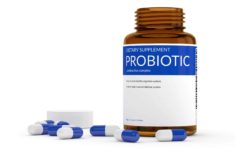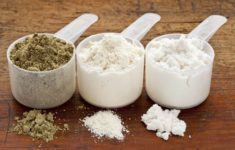Creatine is a natural molecule found in the human body. Most common food sources include red meat and fish.
Creatine weight gain, does it happen and if it does then how?
Well, it does happen, but that might not be a bad thing.
Does Creatine Make You Gain Weight?
Creatine can help your body to build muscle while giving you a better athletic performance. Using creatine as a supplement is connected to weight gain, but not in a sense that you might think.
Then what kind of weight gain are we talking about? Have you ever drank so much water that your belly got bloated?
Well, imagine that same thing happening to the muscles in your body, kind of.
Creatine supplementation is connected with water retention and water weight gain [1]. That means your muscles get filled with water, as a result of taking creatine supplements.
So, in some cases, that apparent increase in muscle mass is just water that managed to find its way into your muscles.
Retention of fluid can be one of the side effects of creatine supplementation, with a possibility of that continuing as long as you are choosing to take creatine as a supplement.
Creatine and Water Retention or Bloat
Why are vast numbers of people choosing to take creatine, when it may lead to bloating? The obvious answer is the increase in performance and muscle mass connected with this supplement.
The only other thing worth mentioning is that gaining water weight usually only happens during the so-called loading phase. Yes, there are different phases and methods for using creatine.
During your first week of using it is when this above-mentioned phase happens. The reason for this loading phase is to get your body used to creatine and to increase the optimal levels of this supplement inside your body (for best performance and better overall gains).
In this phase, you are supposed to take 20-25 grams of creatine per day. This lasts for about a week and is considered to be the time when most people experience water retention.
After this is all done, the normal recommended dose is 5 grams per day.
One thing to note is, that even during the normal intake of creatine (5 grams per day) you may experience water weight gain. This is just a simplified version of this issue. Having a deeper knowledge of what are the best times for using creatine can maximise your fitness results.
But don’t forget about the positive effects of creatine supplements. Such as increased fat burning, better energy levels and strength gains [2].
Which Creatine Is Best for Weight Gain?
What do you mean which creatine? There is more than one? The gods must be crazy! (the title of a great movie, watch it if you can).
A couple of types of creatine exist. Creatine ethyl ester, liquid creatine, creatine monohydrate… Just to name a few.
At this point in time, for the best increase in energy, strength and muscle gain, the recommendation is to use creatine monohydrate.
There isn’t a direct connection between creatine and weight gain, but at the same time, there is. You know?
This supplement helps you build muscles faster, and as we all know muscles weigh more than fat. This where the connection between creatine and gaining weight comes from.
So just to say it one more time, this weight gain does not mean that you are getting fatter but that you are building muscle. You may now say: We got it, don’t need to repeat yourself, jeez!
But as the old saying goes: “We are only as strong as our weakest link.”. Or to put it in even simpler terms, there are dumb-dumbs out there.
What to Do If You Gain Weight on Creatine
When you take creatine you may experience a gain in weight. If it’s connected with gaining an increase in muscle mass, then you should do nothing (because that was the idea in the first place)!
If the gain in weight that you are experiencing is water weight or retention of fluids inside of your body, then there are things that you could do to “relieve” yourself from this problem.
That’s right! Relieve yourself! You don’t get it? Really?
Then let me ask you this, how do you lose extra water in your body, when you are not using creatine?
Finally! Yes, you should urinate. And how do you get yourself into a position that you need to urinate more often, than usual? I can’t do this mystical thing anymore. Water!
Just drink more water, and you will be able to get rid of that excess of water inside your muscles [3].
Who Should and Shouldn’t Take Creatine?
Creatine supplements, unfortunately, are not for everybody.
Even though creatine is used in sports nutrition, and is one of the most tested supplements out there, there are some people that should not be taking it.
Generally, it is safe for most people, but there are ones that should not be taking it.
If you have underlying kidney problems, some sort of a kidney disorder or a disease, before taking any supplement for training (not just creatine) you should seek medical advice!
With great power comes great responsibility, so please don’t take supplementation with creatine lightly.
Creatine does have its benefits, but it may also cause you to experience some side effects. So, just be careful.
Read: Creatine for Women: Should Women Take It?
What to Avoid While Taking Creatine?
Creatine is a diuretic. That means that consuming it may cause dehydration or diarrhea [4]. So, drinking alcohol, coffee or any other kinds of diuretics while on creatine is not advisable.
Creatine may be good for building lean muscle mass, giving you more energy or burning fat, but if you want to avoid negative side effects, you should be careful.
Are There Other Risks of Taking Creatine?
When ingested in recommended doses, creatine is extremely safe for most healthy people.
The most problems caused by creatine are in direct correlation with people choosing to take high amounts of it. Risks, when doing this, include kidney or liver failure, and heart problems [5].
Creatine may also cause your muscles to contract.
Related: Does Creatine Expire or Go Off?
The Bottom Line
Benefits of creatine supplements include increased muscle mass, weight loss, increase in energy and faster fat burning.
Creatine is extremely beneficial when doing high intensity training (such as sprints or weight lifting). It can also help you with gaining lean muscle mass, while at the same time being responsible for better strength gains.
Creatine intake can also, sometimes, boost intracellular water stores in muscle cells. Don’t worry, this is a good thing.
It is responsible for higher levels of adenosine triphosphate (ATP) in your body.
More ATP means more energy to burn during those long workout days.
References
- https://jissn.biomedcentral.com/articles/10.1186/1550-2783-4-6
- https://jissn.biomedcentral.com/articles/10.1186/s12970-017-0173-z
- https://www.healthline.com/nutrition/how-much-water-should-you-drink-per-day
- https://www.shapefit.com/questions/exercise-questions-creatine-side-effects.html
- https://pubmed.ncbi.nlm.nih.gov/17046619/






